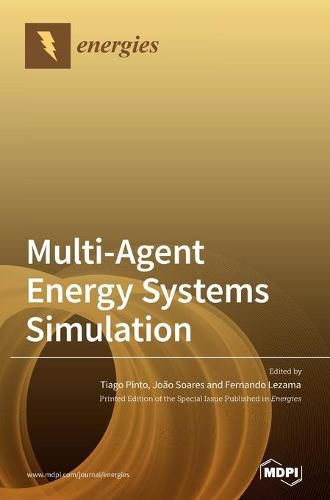Readings Newsletter
Become a Readings Member to make your shopping experience even easier.
Sign in or sign up for free!
You’re not far away from qualifying for FREE standard shipping within Australia
You’ve qualified for FREE standard shipping within Australia
The cart is loading…






This title is printed to order. This book may have been self-published. If so, we cannot guarantee the quality of the content. In the main most books will have gone through the editing process however some may not. We therefore suggest that you be aware of this before ordering this book. If in doubt check either the author or publisher’s details as we are unable to accept any returns unless they are faulty. Please contact us if you have any questions.
The synergy between artificial intelligence and power and energy systems is providing promising solutions to deal with the increasing complexity of the energy sector. Multi-agent systems, in particular, are widely used to simulate complex problems in the power and energy domain as they enable modeling dynamic environments and studying the interactions between the involved players. Multi-agent systems are suitable for dealing not only with problems related to the upper levels of the system, such as the transmission grid and wholesale electricity markets, but also to address challenges associated with the management of distributed generation, renewables, large-scale integration of electric vehicles, and consumption flexibility. Agent-based approaches are also being increasingly used for control and to combine simulation and emulation by enabling modeling of the details of buildings’ electrical devices, microgrids, and smart grid components. This book discusses and highlights the latest advances and trends in multi-agent energy systems simulation. The addressed application topics include the design, modeling, and simulation of electricity markets operation, the management and scheduling of energy resources, the definition of dynamic energy tariffs for consumption and electrical vehicles charging, the large-scale integration of variable renewable energy sources, and mitigation of the associated power network issues.
$9.00 standard shipping within Australia
FREE standard shipping within Australia for orders over $100.00
Express & International shipping calculated at checkout
This title is printed to order. This book may have been self-published. If so, we cannot guarantee the quality of the content. In the main most books will have gone through the editing process however some may not. We therefore suggest that you be aware of this before ordering this book. If in doubt check either the author or publisher’s details as we are unable to accept any returns unless they are faulty. Please contact us if you have any questions.
The synergy between artificial intelligence and power and energy systems is providing promising solutions to deal with the increasing complexity of the energy sector. Multi-agent systems, in particular, are widely used to simulate complex problems in the power and energy domain as they enable modeling dynamic environments and studying the interactions between the involved players. Multi-agent systems are suitable for dealing not only with problems related to the upper levels of the system, such as the transmission grid and wholesale electricity markets, but also to address challenges associated with the management of distributed generation, renewables, large-scale integration of electric vehicles, and consumption flexibility. Agent-based approaches are also being increasingly used for control and to combine simulation and emulation by enabling modeling of the details of buildings’ electrical devices, microgrids, and smart grid components. This book discusses and highlights the latest advances and trends in multi-agent energy systems simulation. The addressed application topics include the design, modeling, and simulation of electricity markets operation, the management and scheduling of energy resources, the definition of dynamic energy tariffs for consumption and electrical vehicles charging, the large-scale integration of variable renewable energy sources, and mitigation of the associated power network issues.